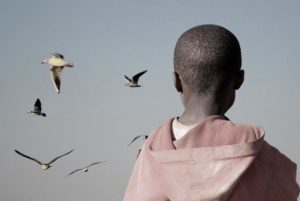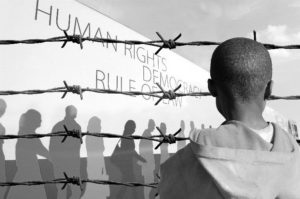Children born prisoners: from conception to detention
The “Maison d’arrêt et de correction d’Abidjan” (the “detention center of Abidjan”, called the “MACA”) is an overpopulated prison. It often accommodates more than 3,000 prisoners instead of the 1,500 allowed by the state (Yao, 2014). There are around a hundred women and some are living with their child (Hanty M. , 2014). Unfortunately, having been sentenced to prison during their pregnancy and disowned by their family (Moussa, 2014), they do not have any other choice but going back to jail with their baby after the delivery.
Thus, the MACA usually accommodates 5 or 6 children aged between 0 and 3 years old (Tallès, 2009). It is not a lot but it is too much in such a violent atmosphere, where the survival of the fittest is the rule. How could they grow up healthily in an irascible and undernourished crowd? (Tallès, 2009). The nursery which used to house them canno t work anymore because of a lack of funding and personnel. The children have no area saved for them and isolated from the adults, they have to play in the prisoners’ covered courtyard and they have to sleep with their mothers, in cells where they are more than twelve persons (Hanty M. , 2014). The children’s status is precarious, the mothers try to take care of them, they have to fight to feed them when they are not capable of breastfeeding them anymore, and they have to protect them from all the dangers you can imagine in such a “dark place”. There, the human conditions are difficult for any human being, especially for a child. Their fundamental rights are neglected. Don’t even think about a cradle and a good diet, nothing is done to ensure a decent living for them.
t work anymore because of a lack of funding and personnel. The children have no area saved for them and isolated from the adults, they have to play in the prisoners’ covered courtyard and they have to sleep with their mothers, in cells where they are more than twelve persons (Hanty M. , 2014). The children’s status is precarious, the mothers try to take care of them, they have to fight to feed them when they are not capable of breastfeeding them anymore, and they have to protect them from all the dangers you can imagine in such a “dark place”. There, the human conditions are difficult for any human being, especially for a child. Their fundamental rights are neglected. Don’t even think about a cradle and a good diet, nothing is done to ensure a decent living for them.
The “harmonious development of [the child(s] personality” and the “atmosphere of happiness, love and understanding [for him to grow]”, highlighted by the Convention on the Rights of the Child (CRC), are ignored. Instead, children can become withdrawn, may be late to develop, and may face death.
When solidarity overcomes the shortcomings of the State: the involvement of an NGO
The children we are talking about are prisoners just because they are born at a bad time. No document formalize their presence in prison despite the existence of a mandatory rule in the Ivory Coast (Moussa, 2014). Given that they are not registered, they are not treated like others convicted persons; for example, they don’t have access to medical consultations. According to Ivory law, the child can stay in prison close to his or her mum up to the age of 2 (Moussa, 2014). Unfortunately, after these 2 years, nothing was planned by the authorities to ensure that the child is “freed” and integrated to a normal environment (Yao, 2014).
The Mireille Hanty Foundation is an NGO that has been created in 2009 (Hanty F. M.). It works for the “desperate hearts”.
The NGO has been extremely touched by the deprived children born in prison and in 2013, the founder decided to launch a programme cold “maternité in prison” – maternity in prison –. Thanks to that programme, the children have had access to medical consultation and Christmas celebrations were organized to make the children happy (Ayana, 2014). The NGO also fought for them to go to school. It succeeded and the children have left the prison to go to class. For a few hours they had a normal life and the education right promoted by the CRC was realized (Hanty M. , 2014).
Would you agree to continue making children’s rights happen?
 The issue we discussed is not solved yet: the initiative of the Mireille Hanty Foundation has to continue and to spread to other prisons in the Ivory Coast (Nanita, 2014). Nonetheless, denouncing the situation wasn’t our only purpose, we wanted to evaluate the advances and point out the positive as well. The Foundation has accomplished a wonderful work and it shows that solidary can contribute to justice, can make children’s rights happen.
The issue we discussed is not solved yet: the initiative of the Mireille Hanty Foundation has to continue and to spread to other prisons in the Ivory Coast (Nanita, 2014). Nonetheless, denouncing the situation wasn’t our only purpose, we wanted to evaluate the advances and point out the positive as well. The Foundation has accomplished a wonderful work and it shows that solidary can contribute to justice, can make children’s rights happen.
By way of conclusion, keep in mind, dear readers, that in supporting associations, NGOs or any other organisms working for the respect of children’s rights, we can win: you give a chance to keep up that kind of programme. Let’s not change anything; we have to work “together to make children’s rights happen”.
Written by : Franciska Bangisa Proofread by : Salomé Guibreteau |
Ayana, T. (2014, Septembre 15). Les enfants incarcérés la lutte de la fondation Mireille Hanty. Retrieved from Ayanawebzine: http://ayanawebzine.com/lenfants-incarceres-la-lutte-de-la-fondation-mireille-hanty/
Hanty, F. M. (s.d.). Qui sommes-nous. Retrieved from Fondation Mireille Hanty: http://www.fondationmireillehanty.org/site/qui-sommes-nous/
Hanty, M. (2014, Février 15). Reportage Fondation Mireille Hanty enfants incarcérés. Retrieved from Fondation Mireille Hanty: http://www.fondationmireillehanty.org/site/reportage-fondation-mireille-hanty-enfants-incarceres/
Hanty, M. (2014, Juillet 21). Visite aux enfants vivant avec leurs mères détenues de la maison d’arrêt et de correction d’Abidjan. Retrieved from Fondation Mireille Hanty: http://www.fondationmireillehanty.org/site/visite-aux-enfants-vivant-avec-leurs-meres-detenues-de-la-maison-darret-et-de-correction-dabidjan/
Moussa, O. (2014, Février 26). Société. Retrieved from News.Abidjan: http://news.abidjan.net/h/490234.html
Nanita. (2014, Février 12). Société. Retrieved from Koaci: http://koaci.com/m/cote-d%E2%80%99ivoire-initiative-pour-enfants-%E2%80%98%E2%80%99incarceres%E2%80%99%E2%80%99-maca-89815-i.html
Tallès, O. (2009, Mai 22). Actualité. Retrieved from La Croix: http://www.la-croix.com/Actualite/Monde/Les-droits-de-l-enfant-ivoirien-restent-a-la-porte-des-prisons-_NG_-2009-05-22-535215
United Nations, G. A. (1989, Novembre 20). Convention on the Rights of the Child. Retrieved from OHCHR: http://www.ohchr.org/EN/ProfessionalInterest/Pages/CRC.aspx
Yao, M. (2014, Janvier 18). Chronique. Retrieved from Letrangere Mondoblog: http://letrangere.mondoblog.org/2014/01/18/maison-darret-et-de-correction-dabidjan/


